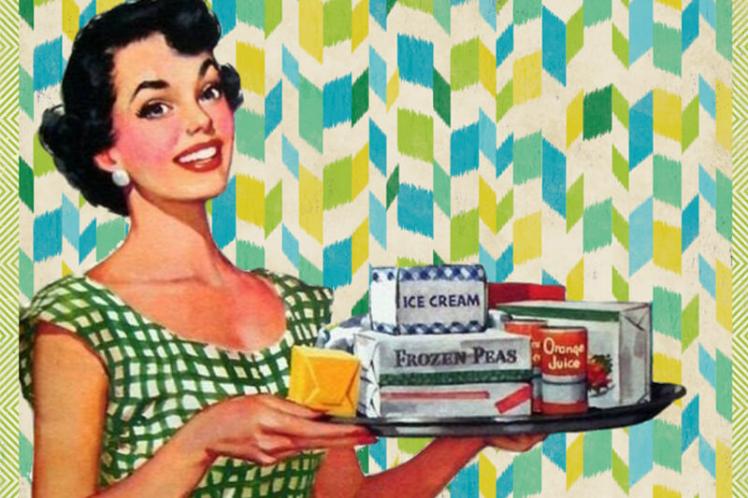Why it's time to crackdown on gender stereotypes

Julie Seal, Creative Strategist at Facebook, provides a light-hearted look at why gender stereotypes are rubbish and what advertisers can do to stop them.
One of my not-so-favourite stereotypes is 'Sexy Me Time' woman. She's found everywhere from inexplicably finding yoghurt erotic to drinking diet fizzy drinks. Lately she's found her way to alcohol, travel and even insurance. She giggles inanely at everything, she’s always immaculate, and is frequently found in the company of a totally vacuous, muscle-bound male ‘torso-for-hire’.
Next, there’s the straight-forward 'Hapless Everyman' husband. I happen to know a lot about this guy personally. My lodger is an ads actor and cast as 'tall-ginger-slightly-portly-of-average-attraction' (he'll not love me for this, but it's his secret weapon). This guy is never too attractive to be threatening, and often looks either bemused or blandly satisfied. He’s always embarrassed by his lack of cool, his more knowledgeable friend, or his foot-in mouth comments - or not-at-all embarrassed but probably should be.
Although seemingly not insidious, these are eye-rollingly predictable. After years of the same predictable tropes, surely it’s time for a little more of the industry’s favourite word: authenticity. The world really has moved on, and while diversity can be helped through casting, changing stereotypes needs to be done in the original concept.
That’s why the responsibility lies with the team to notice what others might not, in the most polite and open way possible; nobody wants to discover they’re accidentally coming across as sexist (or racist, ableist, homophobic, etc.) so the question begs, does the culture within ad agencies allow for that ‘call out’ to happen? If an Executive Creative Director was discussing an idea, would a junior in the team feel comfortable and safe to point out sexism, or would they feel derided, shy, weird or rude for doing so?
Are advertising agencies diverse enough for stereotypes to be noticed?
This brings me to ad agencies, and whether they’re really diverse and inclusive enough themselves for these stereotypes to be acknowledged. Sadly, I’m sure they’re often not. Let me give you an example. I recently had a conversation with a Creative Director that went like this:
"Hmm, cute, but do you think it’s a bad thing that stereotypes portray mums as perpetually warm, nurturing, ever-baking and comforting home-makers?"
My reply: "Yes, because mums also fix cars, are engineers, and some only cook things that ping, hate pinnies, mashed potatoes and having to feed people. Mums are as complex, individual, fascinating and diverse as dads, who equally don’t all like power tools and sports."
This conversation was with a straight, white, privileged man. I’m senior and non-shrinking. That’s why I called it out, so the next girl who sees the ad wouldn’t feel trapped into following the limited path of the ‘nurturing mum’ figure, but instead the ‘everything is possible’ human that they are.
If we don’t have crucial conversations like these, mistakes will happen
In offices all over ad-land, it is crucial to constantly question what kind of society we want to shape, because there’s no doubt that advertising changes culture. We need to create it and not just reflect it retrospectively.
So perhaps my problem with gender stereotyping in advertising isn’t about the gender stereotypes at all... it’s that we all too often depict 'real' lives in ads. That's never been my favourite style of advertising, because while the stories told and the characters shown are intended to be 'relatable', how far do they go in genuinely reflecting our complicated gender dynamics?
In my own family, my mother isn’t ‘mumsie’, but sporty, exciting and entrepreneurial. My dad is the amazing family cook and ‘mumsier’ than the rest of the family put together. My sister, the make-up artist, isn’t a done-up, dumb dolly-bird, but subtle and incredibly smart. My other sister, the scientist, isn’t just bookish but also a talented and eccentric artist. When our own family dynamics decry what we see in ads, it can seem like it’s only ever the media that orchestrates these supposed gender roles. Maybe real ‘real’ life isn’t actually possible to depict in 30-seconds?
How useful is ‘relatable’ at the very crucial attribute of piquing interest?
Effective advertising – whether TV, press or OOH – often has to compete for our texting, swiping and scrolling attention as much as the ads on Facebook or Instagram do. ‘Relatable’ is too benign to grab that attention. 'Real life' is what we see in sitcoms, movies and soaps, and so advertising has the potential to become the reserve of experimental forms in craft and storytelling. That’s an exciting prospect, and means the risk of stereotypes is almost entirely mitigated.
Besides, who wants to see ‘real life’ anyway? Don’t we get enough of that in, well, real-life? I'd much rather see slightly bonkers even for washing powder, beauty products or supermarkets. Give me bodies flopping off floating mattresses and darkly-comic animations, mesmerising surreal trickery and creepy, melting chocolate bunny rabbits any day.
For a more subtle but insidious possibility…
Maybe many female-targeted ads lean toward gender stereotypes because it’s presumed that women want to see women being ‘womanly’ and doing typically ‘womanly things’, that women cannot grasp the surreal, obtuse or artsy. Would Guinness’s ‘Horses’ ever have existed if that product had solely targeted women? When ‘audience: female’ is on the brief, does that incite Sex & The City style, or the more recent feminist band-wagoning? I fear it might, though rarely for the young, exciting and brilliant female creatives, but for the wider team they’re a part of.
The perfect long-term fix
So there it is - maximise the diversity of the creatives making the ads in the first place. In the meantime, maybe we can shake the old-school, stereotyping creatives, by raising awareness that it's a problem in the first place. In which case, well done ASA - you've certainly made that point.



